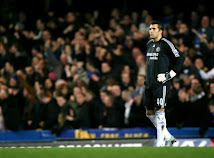John Terry will not play in England's home match versus Montenegro tomorrow (Tuesday) due to injury.
A statement on the Football Association website reads:
'John Terry has returned to Chelsea with a back injury.
'Terry was assessed by England medical staff on Sunday and will not be fit to play any part in Tuesday's game against Montenegro.
'No further call-ups will be made at this time.'
The Chelsea captain missed England matches against Bulgaria and Switzerland last month as he recovered from hamstring and glut muscle injuries.
Monday, October 11, 2010
Thursday, October 7, 2010
LEADERS ONCE MORE COME TO THE BRIDGE
Stamford Bridge may not have quite matched Anfield as the focal point for football news and discussion on Wednesday, but it came as close as anywhere.
For the third year running the extensive facilities available in the West Stand are hosting the Leaders in Football conference and on Wednesday afternoon Chelsea FC chairman Bruce Buck was one of the main speakers.
The conference is attended by 1,000 senior executives from the world of football and other delegates giving talks include Mohamed bin Hammam, a member of Fifa's Executive Committee and president of the Asian Football Confederation, and Danny Jordaan who was chief executive of the World Cup Finals in South Africa back in the summer. The various bid teams for the 2018 and 2022 World Cups were also represented,
However it was the hot topic of club ownership that brought Buck to the microphone for a session titled 'The chairman's view: Is ownership a rich man's play thing?'
He was joined on stage by David Gold, joint chairman of West Ham United, Steve Morgan, chairman of Wolverhampton Wanderers and Dave Checketts, owner of St Louis Blues hockey team and Real Salt Lake soccer team in the USA.
There couldn't have been a more appropriate time for such a discussion with Liverpool FC dominating the sports news.
'I don't think foreign owners per se are bad,' Buck told the conference.
'Of course I would say that, but it depends on what the objective of the foreign owner is in buying a club. If it is to make a quick few dollars, or if it is long-term profit, they are probably barking up the wrong tree.
'If they are in the position to recognise the history and the traditions of whatever club they are buying I would say let's welcome the new owner with open arms.'
Checketts stated that most US businessmen moving into club ownership this side of the Atlantic see it is an opportunity to invest and then exit and multiply their investment.
'But like most American sports owners they think they are going to go in there, do a job and be a big hero and win many championships,' he added. 'Sometimes that doesn't work out. See Exhibit A, Liverpool.
'I don't think the owners there built a relationship with the fan groups. I don't think they listened.'
While the consensus among the speakers was against the type of heavy leverage when purchasing football clubs that leaves them saddled with big debts, Buck defended debt that can be properly paid off. He explained it may become an even more important part of football financing under Uefa's new financial rules that will control money that can be invested in by owners.
'I think everybody supports financial fair play but it depends how you do it,' he added. 'It is the fine print that is really the issue.'
It was agreed limits on club debt and salary capping similar to that seen in US sports could only work in the Premier League if the rules applied across all Europe, while relegation, which does not occur in the States, is here to stay even if it has the potential to blow apart financial plans.
'Relegation and promotion is one of the great cultural aspects of European football,' insisted Buck, 'and although it is a problem for the teams at the bottom of each league in terms of the risk-to-reward ratio when they consider investment, it should always be the case that someone in Dagenham can hope his club will be in the Premier League one day.'
Last season Portsmouth showed that financial meltdown could occur in the Premier League before relegation. The panel were confident that was a one-off.
'The Premier League clubs feel we didn't have rules in place that gave us early warnings of Portsmouth's financial difficulties in terms of payment to tax authorities and debt repayment that was overdue,' Buck explained.
'So in the summer we passed a variety of rules that will allow the Premier League board to have much closer scrutiny of how clubs are doing and if they see things that are problem, give us a way of dealing with them before they are a real problem.'
The Leaders in Football conference continues today (Thursday).
For the third year running the extensive facilities available in the West Stand are hosting the Leaders in Football conference and on Wednesday afternoon Chelsea FC chairman Bruce Buck was one of the main speakers.
The conference is attended by 1,000 senior executives from the world of football and other delegates giving talks include Mohamed bin Hammam, a member of Fifa's Executive Committee and president of the Asian Football Confederation, and Danny Jordaan who was chief executive of the World Cup Finals in South Africa back in the summer. The various bid teams for the 2018 and 2022 World Cups were also represented,
However it was the hot topic of club ownership that brought Buck to the microphone for a session titled 'The chairman's view: Is ownership a rich man's play thing?'
He was joined on stage by David Gold, joint chairman of West Ham United, Steve Morgan, chairman of Wolverhampton Wanderers and Dave Checketts, owner of St Louis Blues hockey team and Real Salt Lake soccer team in the USA.
There couldn't have been a more appropriate time for such a discussion with Liverpool FC dominating the sports news.
'I don't think foreign owners per se are bad,' Buck told the conference.
'Of course I would say that, but it depends on what the objective of the foreign owner is in buying a club. If it is to make a quick few dollars, or if it is long-term profit, they are probably barking up the wrong tree.
'If they are in the position to recognise the history and the traditions of whatever club they are buying I would say let's welcome the new owner with open arms.'
Checketts stated that most US businessmen moving into club ownership this side of the Atlantic see it is an opportunity to invest and then exit and multiply their investment.
'But like most American sports owners they think they are going to go in there, do a job and be a big hero and win many championships,' he added. 'Sometimes that doesn't work out. See Exhibit A, Liverpool.
'I don't think the owners there built a relationship with the fan groups. I don't think they listened.'
While the consensus among the speakers was against the type of heavy leverage when purchasing football clubs that leaves them saddled with big debts, Buck defended debt that can be properly paid off. He explained it may become an even more important part of football financing under Uefa's new financial rules that will control money that can be invested in by owners.
'I think everybody supports financial fair play but it depends how you do it,' he added. 'It is the fine print that is really the issue.'
It was agreed limits on club debt and salary capping similar to that seen in US sports could only work in the Premier League if the rules applied across all Europe, while relegation, which does not occur in the States, is here to stay even if it has the potential to blow apart financial plans.
'Relegation and promotion is one of the great cultural aspects of European football,' insisted Buck, 'and although it is a problem for the teams at the bottom of each league in terms of the risk-to-reward ratio when they consider investment, it should always be the case that someone in Dagenham can hope his club will be in the Premier League one day.'
Last season Portsmouth showed that financial meltdown could occur in the Premier League before relegation. The panel were confident that was a one-off.
'The Premier League clubs feel we didn't have rules in place that gave us early warnings of Portsmouth's financial difficulties in terms of payment to tax authorities and debt repayment that was overdue,' Buck explained.
'So in the summer we passed a variety of rules that will allow the Premier League board to have much closer scrutiny of how clubs are doing and if they see things that are problem, give us a way of dealing with them before they are a real problem.'
The Leaders in Football conference continues today (Thursday).
Subscribe to:
Posts (Atom)




























